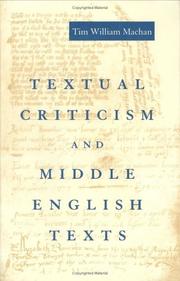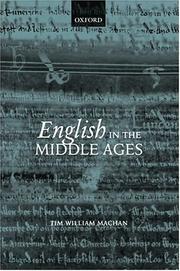| Listing 1 - 10 of 17 | << page >> |
Sort by
|

ISBN: 0813915082 Year: 1994 Publisher: Charlottesville ; London University Press of Virginia
Abstract | Keywords | Export | Availability | Bookmark
 Loading...
Loading...Choose an application
- Reference Manager
- EndNote
- RefWorks (Direct export to RefWorks)
Paleografie [Engelse ] --- Paleography [English ] --- Paléographie anglaise --- English literature --- Middle English, 1100-1500 --- Criticism [Textual ] --- Manuscripts [English ] (Middle) --- Editing --- Manuscripts, English (Middle) - Editing. --- Littérature anglaise --- Manuscrits anglais (moyen anglais) --- 1100-1500 (moyen anglais) --- Critique textuelle --- Edition critique

ISBN: 0199262683 1280758600 0191555681 1423771117 0199282129 0191718998 Year: 2003 Publisher: Oxford ; New York Oxford University Press
Abstract | Keywords | Export | Availability | Bookmark
 Loading...
Loading...Choose an application
- Reference Manager
- EndNote
- RefWorks (Direct export to RefWorks)
An enquiry into the use and status of English in medieval England, this text is concerned with English relative to French and Latin and its regional and social varieties in relation to each other. It examines medieval views of language and the significance of English and how these shaped its use.
Language and culture --- -English language --- -Germanic languages --- Culture and language --- Culture --- History --- -Dialects --- Tense --- Variation --- -History --- English language --- Germanic languages --- Middle English language --- Middle English, 1100-1500 --- Middle English, 1100-1500&delete& --- Discourse analysis --- Texts --- England --- To 1500
Book
ISBN: 0198736673 0191668362 0199601259 0191759031 9780191668364 9780199601257 Year: 2013 Publisher: Oxford, U.K. Oxford University Press
Abstract | Keywords | Export | Availability | Bookmark
 Loading...
Loading...Choose an application
- Reference Manager
- EndNote
- RefWorks (Direct export to RefWorks)
What is English? Can we be as certain as we usually are when we say something is not English? To find some answers, Tim Machan explores the language's present and past and looks ahead to its futures among the one and a half billion people who speak it.
English language --- History. --- Social aspects. --- Germanic languages
Book
ISBN: 9780199232123 Year: 2009 Publisher: Oxford : Oxford university press,
Abstract | Keywords | Export | Availability | Bookmark
 Loading...
Loading...Choose an application
- Reference Manager
- EndNote
- RefWorks (Direct export to RefWorks)
English language --- Linguistic change --- Sociolinguistics --- Psychological aspects. --- Variation. --- Language and languages --- Language and society --- Society and language --- Sociology of language --- Language and culture --- Linguistics --- Sociology --- Integrational linguistics (Oxford school) --- Change, Linguistic --- Language change --- Historical linguistics --- Psychological aspects --- Variation --- Social aspects --- Sociological aspects --- Dialects --- Germanic languages
Book
ISBN: 1281930733 9786611930738 0191552488 9780191552489 0199232121 9780199232123 1383036594 Year: 2009 Publisher: Oxford New York Oxford University Press
Abstract | Keywords | Export | Availability | Bookmark
 Loading...
Loading...Choose an application
- Reference Manager
- EndNote
- RefWorks (Direct export to RefWorks)
This wide-ranging history of language anxiety ranges from the Tower of Babel to the Internet. It shows how worry about language results from and causes linguistic change, as well as fuelling perennial concerns about class, culture, identity and social change.
English language --- Linguistic change --- Sociolinguistics --- Language and languages --- Language and society --- Society and language --- Sociology of language --- Language and culture --- Linguistics --- Sociology --- Integrational linguistics (Oxford school) --- Change, Linguistic --- Language change --- Historical linguistics --- Psychological aspects. --- Variation. --- Social aspects --- Sociological aspects --- Dialects --- Germanic languages
Book
ISBN: 1316463664 1316464059 131646444X 1107415837 1316466396 1316464830 1107058597 1107645743 1316461327 Year: 2016 Publisher: Cambridge : Cambridge University Press,
Abstract | Keywords | Export | Availability | Bookmark
 Loading...
Loading...Choose an application
- Reference Manager
- EndNote
- RefWorks (Direct export to RefWorks)
Imagining Medieval English is concerned with how we think about language, and simply through the process of thinking about it, give substance to an array of phenomena, including grammar, usage, variation, change, regional dialects, sociolects, registers, periodization, and even language itself. Leading scholars in the field explore conventional conceptualisations of medieval English, and consider possible alternatives and their implications for cultural as well as linguistic history. They explore not only the language's structural traits, but also the sociolinguistic and theoretical expectations that frame them and make them real. Spanning the period from 500 to 1500 and drawing on a wide range of examples, the chapters discuss topics such as medieval multilingualism, colloquial medieval English, standard and regional varieties, and the post-medieval reception of Old and Middle English. Together, they argue that what medieval English is, depends, in part, on who's looking at it, how, when and why.
English language --- Language and culture --- Culture and language --- Culture --- Germanic languages --- Middle English language --- Discourse analysis. --- Variation. --- History --- Texts.
Book
ISBN: 9780198736677 Year: 2016 Publisher: Oxford : Oxford University Press,
Abstract | Keywords | Export | Availability | Bookmark
 Loading...
Loading...Choose an application
- Reference Manager
- EndNote
- RefWorks (Direct export to RefWorks)
English language --- History. --- Social aspects.
Book
ISBN: 9780888445612 Year: 2008 Publisher: Durham Toronto Durham Univeristy. Centre for medieval and renaissance studies Pontifical Institute of Mediaeval Studies
Abstract | Keywords | Export | Availability | Bookmark
 Loading...
Loading...Choose an application
- Reference Manager
- EndNote
- RefWorks (Direct export to RefWorks)
Multi
ISBN: 9781107415836 9781107058590 9781107645745 Year: 2016 Publisher: Cambridge Cambridge University Press
Abstract | Keywords | Export | Availability | Bookmark
 Loading...
Loading...Choose an application
- Reference Manager
- EndNote
- RefWorks (Direct export to RefWorks)
Sociolinguistics --- English language --- England
Book
ISBN: 9780198846369 Year: 2022 Publisher: Oxford ; New York : Oxford University Press,
Abstract | Keywords | Export | Availability | Bookmark
 Loading...
Loading...Choose an application
- Reference Manager
- EndNote
- RefWorks (Direct export to RefWorks)
Any history of English starts with the evidence its narrators select, the historical periods they focus on, and the guiding principles and frameworks they adopt. Even slightly different choices lead to significantly different narratives. English Begins at Jamestown investigates the factors behind these choices and the effects they have on our understanding of the English language and its history. Tim Machan explores how people tell and have told the story of English, from its Indo-European origins to its present-day status as a global language. He describes how narrative principles are constructed, what kinds of facts and analyses they allow or prevent, and what can be known outside of them. The book's historically and critically wide-ranging arguments center on the themes of social purpose, aesthetics, periodization, and grammatical structure, while the conclusion extends the discussion into the roles of speakers themselves, who have transformed the grammar and pragmatics of English since the colonial period embodied in the Jamestown settlement. English Begins at Jamestown shows that there are better, worse, and wrong ways to narrate the language's history, even if there cannot necessarily be one correct way.
Anglais (langue) --- English language --- Historiographie. --- History. --- Historiography.
| Listing 1 - 10 of 17 | << page >> |
Sort by
|

 Search
Search Feedback
Feedback About UniCat
About UniCat  Help
Help News
News